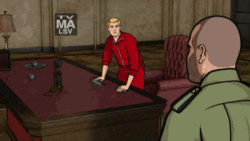Let’s get one thing clear before I get started here. I cannot write songs. At all. The idea of putting notes together and creating some sort of melody is as alien to me as the notion of running marathons for fun. Some people seem able to do it, but I can’t begin to imagine how.
But I am a writer and have respect for wordplay, imagery, and poetry, so I often find myself judging certain songs not on their hooks or melodies, but on their lyrics. And sometimes I hear a song and call only think “Are you even trying?”
Now, I’m not talking about the easy targets here. Katy Perry and Taylor Swift are out to please teens, so they can sing whatever bubblegum lyrics are going to please that demo and it’s fine as long as they do it over there, away from me. Likewise, nobody listens to Ke$ha or the Black Eyed Peas for lyrical depth, they’re in it for the beat and the catchy hooks that encourage folk to get their dance on. Andrew W.K. simply has some passionate beliefs on parties and partying that he’s trying to get out there. And if the lyric “Rub that shit, it’s yours, bitch, grab his dick, it’s yours, bitch” offends you, maybe you shouldn’t have been listening to Lil John in the first place.
But some people in other genres just get stuck in my craw. And here’s some examples.
54/40: Lies to Me
At it’s heart, Lies to Me by Canadian rock band 54/40 is about a guy who feels he doesn’t deserve to be as happy as his girlfriend makes him, and suspects that when she tells him otherwise she’s lying, saying he’s a better man than he is, but for now he’s happy to buy into the delusion. Simple notions that dudes and ladies of flawed self-esteem can easily relate to. There’s just one repeated line that drives me crazy.
Maybe it’s not fair to her
To believe in what she says
That’s the way it goes sometimes
And it can also go the other way
YES. BECAUSE THAT IS WHAT “SOMETIMES” MEANS.
“It can also go the other way.” That was implied by your use of the word “sometimes.” We have other words that mean “That’s the way it goes, and there is no other way it could go,” like “always” or “consistently.” But no, you wanted us to be absolutely sure we understand what “sometimes” means.
The lyric feels lazy. It feels like the lyricist found himself a line short in an already emaciated verse–that’s it, by the way. That’s the entire verse. From there it’s right into the bridge. Anyway. Having come up with three whole lines for his second verse, he finds himself out of ideas and needing a rhyme for “says,” so he opts for a detailed explanation of what “sometimes” means. It’s a lazy time-filler of a lyric, devoid of any real meaning…
And he repeats it twice.
Which means he thinks it’s meaningful. Meaningful enough to sing twice in a song that only has eight lines of actual verse. It just… I just wanna…

Tariq: Chevrolet Way
Okay. Many of you probably haven’t heard this song. I envy you that. It’s from a formerly Calgary-based artist named Tariq who had two songs receive some radio play on Canadian rock stations in the 90s: this and Not Just a Waiter. Not Just a Waiter is what it sounds like, an anthem about how he’s an artist and not simply a conduit between kitchen and customer. Chevrolet Way is also exactly what it sounds like: a blatant attempt to sell a song to a car company. Or so it appears, given how little effort he put into anything but the chorus. To illustrate my point, here’s the chorus:
In the Chevrolet way,
I’m thinkin about the world today.
It’s a four-by-four road,
more torque, more load.
It’s a Chevrolet way yeah,
so you better get the hell out of the way.
Nothing that would be out of place in any car ad ever recorded. Now, here’s a sample of what he came up with for a verse:
My girl she loves me good,
I think she always will too.
But in southern Alberta, southern Alberta,
his neck went redder as the sky turned blue.
WHAT. WHAT. What does any of that mean? Whose neck? There was no third person in this verse before now! It’s like you had a seizure halfway through and forgot what you were singing about! The verses from One Week by Barenaked Ladies make more sense and the guy who wrote them has freely admitted to making them up as he went along!
Listening to this song made me feel like I was having a stroke. His album only sold 10,000 copies, and ten years later Tariq was a guitarist in an obscure Vancouver band and a radio host on CBC Radio 3. Chevrolet Way did not land him a car commercial… but it did get him a Juno nomination.

Ko: Capable of Love
They say Ko writes songs so deeply personal he sometimes breaks down onstage. If that’s true, and this is an example, then I’m sorry Ko had such a painful relationship with an addict. Loving someone that’s insistent on destroying themselves is a bitch.
That said.
So lick a ring around this L
So that it burns all night
Then I pass round that Philly so, so
So we can all get high
This, I admit, may not be Ko’s fault, but in the first half of his chorus he’s thrown out two slang terms for marijuana I’d never heard before. And “L?” Seriously, L is a slang term for a joint now? We had a slang term for a joint that was basically one letter. Jay. As in the letter J, first letter in the word “joint.” Precise and sensible. L? Meaningless and redundant.
Who do I speak to about putting a stop to this?
The Dirty Heads: Lay Me Down
Now this one doesn’t actually anger me. But it’s a little throwing. This song is a story, the story of two lovers on the run from the law. Here’s a sample from verse one.
Well this is how it starts Two lovers in the dark
On the run, from the one That they called Sheriff Spark
Six guns by their side and bullets around their waist
Two shots to the sky
Signal sound for the chase
Verse two…
Well it’s the story of the two
Always on the move.
They got nothing left to lose
‘Cept their guns and their wounds
And then…
But the sheriff finally found them with his eyes seeing red.
So the lovers had to shoot him down and fill him full of lead
A simple narrative of two lovers whose only escape was to flee to Mexico and kill the man hell-bent on catching them. But here’s what we have in verse three…
Well you’re my green-eyed girl And I’ve been running around with you.
It’s the afternoon and we got nothing left to do.
So wipe the dirt off, or Take your shirt off,
And we should go hit the cantina, We got work off.
Wait wait wait wait wait. Wait. Back up. In the last verse you shot and killed a man, don’t just start singing about beachside sexy-time fun like that didn’t happen! Okay, yes, tonally the third verse fits the chorus much better (the chorus being about finding a safe tropical place to rest and then bang), but come on. I still don’t know what these two even did that caused a sheriff to hunt them all the way to whatever tropical beach town they settled in once they were done murdering. Maybe they were wrongfully accused and have finally escaped an unjust fate. Maybe they’re serial killers and everyone in this town is going to die. I don’t know. I just know they’re having fun on a coastal town now, and that it a hell of an awkward gear shift to go from “they escaped the law by killing it to death” to “SPRING BREAK FOREVER, BITCHES! WOOO!”
It’s still catchy, though. So unlike Capable of Love, I will not kill the radio rather than listen to this one. But I maintain, it’s like they brought in a second lyricist, played him the tune, and then asked him to write a verse without telling him what the rest of the song was about.
Next time… I will probably revisit another old script. Hopefully some people are still enjoying that stroll down my path of past literary mistakes.

